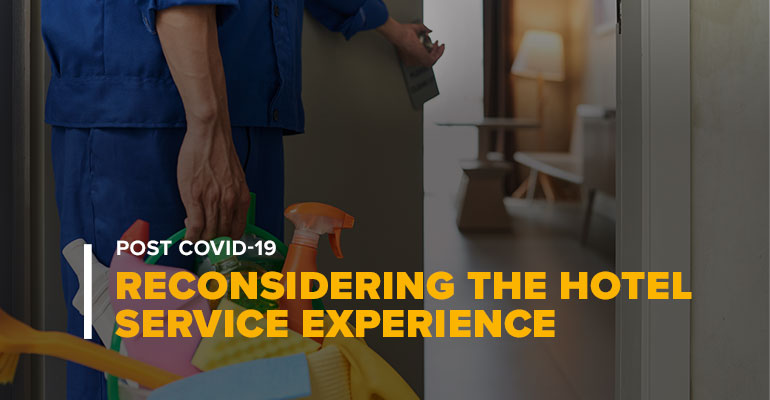I had a very interesting discussion with one of our partners last week regarding the extent of the challenges that confront hoteliers due to COVID-19 – which, it is fair to say, were unimagined just a few months ago. Today, he is very carefully considering how his organization addresses re-opening their hotels as they face an environment in which there is neither a vaccine for COVID-19 nor a cure. As we talked through scenarios for operating under these conditions, he made a comment that highlights the enormity of the challenge: “We essentially have to completely reconsider how we deliver the hotel service experience.”
Regardless of the intensity of the efforts, hotels must be prepared to offer services in a way that not only provides the right quality of service, but also allows guests to feel secure. This is an immense task for the industry. We must consider how to keep our employees and guests safe when a great deal about the virus is still unknown.
There has been a lot of focus in the press on cleaning. In the past, hotels tried to ensure that cleaning processes were as unobtrusive as possible; now there will be value in making those processes visible. Various major brands have announced alliances and new methods for ensuring the sanitation of the guest room. Organizations will introduce additional cleaning processes, new material and new training. Something as basic as a spray bottle marked as a sanitizing agent will be a welcome sight, as will hotel staff visibly wiping things down. All these efforts are essential to helping guests feel secure when they stay in a hotel, but there is more to consider.
For an industry built on “high-touch” service, redefining the service experience will ultimately be a collaboration between the hotel, its employees, and guests. A hotel's response to post-quarantine operations will require rethinking many aspects of the service delivery process starting with check-in.
While many guests will be far more open to using an app to check in remotely and, ideally, use their smart phone as a room key, there will still be guests who need answers to questions and help from a human. Front desks will need to add the kind of plexiglass barriers commonly seen in banks, grocery stores, restaurants and pharmacies. Guests will expect service staff to wear protective gear which will serve to comfort both parties.
Door staff, Bell staff, and other front service staff will, in all likelihood, be used less frequently. But more importantly, common procedures such as a doorman removing guest luggage from a vehicle will now require an exchange to secure approval. Even with staff wearing personal protective equipment (PPE) it will no longer be appropriate to assume that guests want any service that involves a third party handling their luggage or personal items of any sort. For resorts that handle cars, valet service will be used less frequently, and guests will need to see that their cars have been sanitized.
In restaurants, many operations will adopt technologies that let guests order and pay from their mobile devices to minimize contact. On an equally important scale, select service operations offering free breakfasts will have to revise their service process. Bulk cereals will be replaced by individual packages, and many items set up in a buffet format will have to be offered in a package (fruit, yogurt, etc.). Bread and baked goods will probably have to be pre-packed for guests and trays of hot food (eggs, bacon, etc.) will have to be preportioned in secure packages or replaced entirely.
Even fitness rooms will require thought, especially if they are unattended. For example, as guests will not be confident that the previous guest will have wiped down the equipment, perhaps there will be a supply of packaged sanitizing cloths that a guest can use before using exercise equipment.
Every aspect of service that impacts the guest will also have to be assessed through the eyes of the employee. They will want PPE for themselves as much as the guests will want to see them wear it. Common exchanges such as room service delivery will require thoughtful review so the people delivering the food will feel secure. And employees are likely to prefer punching in for shifts on their smart phones rather than on a physical time clock.
Hoteliers may have to reconsider everything from major services such as room cleaning to various amenities that have generally been taken for granted. But success in this new environment will require giving careful thought to every step of the service delivery process to ensure not only that guests and employees feel safe, but that they are safe.
Know someone trying to solve their workforce management problems? Share this post them! Or, if you have questions comments, leave them below.






